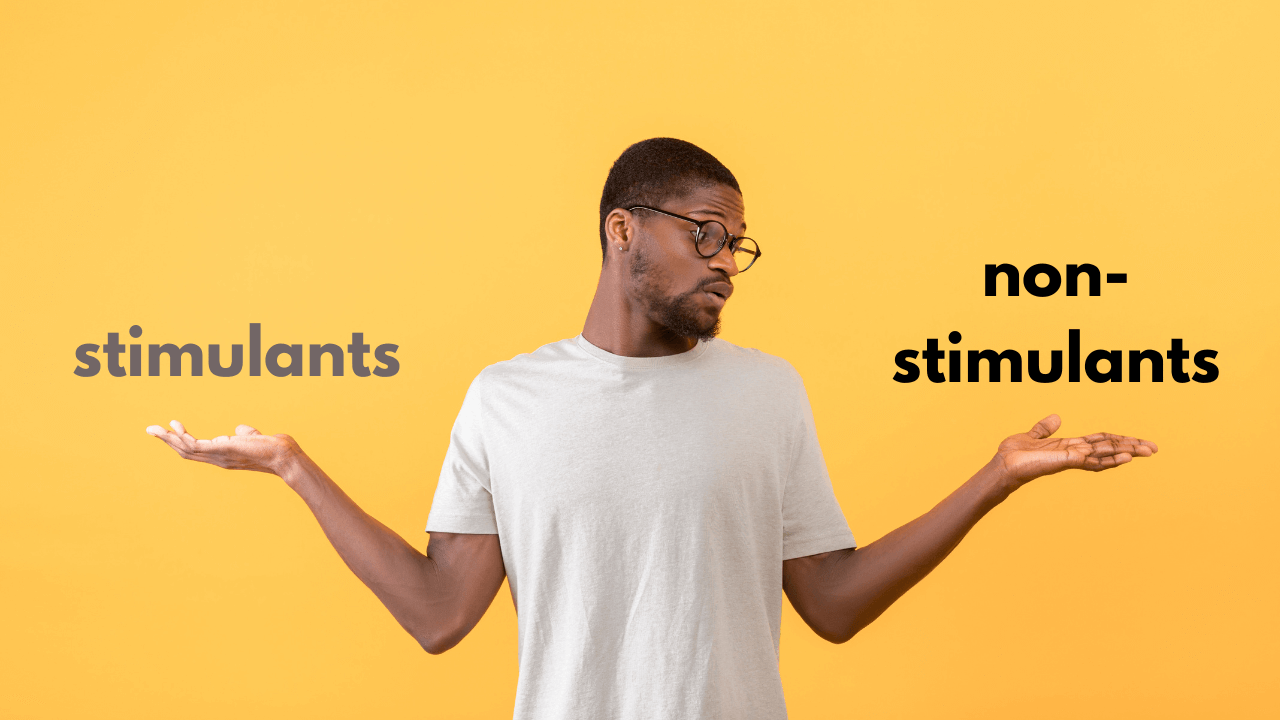While stimulants are typically the first line of treatment for ADHD and often the most effective medication, they don't always work for everyone with ADHD. For some, they can lead to problems like increased anxiety, sleeping difficulties, or rapid weight loss.
Mild stimulant side effects don’t necessarily mean you must stop taking them completely. However, non-stimulant medications are a useful alternative in more specific or severe situations.
It can be difficult to know whether stimulants or non-stimulants are the correct type of ADHD medication for you. So let’s dive into the differences between stimulants and nonstimulants, the side effects of stimulants, and cases where stimulants may not be right for you.
⚕️ Medical Disclaimer: The information provided in this article is for educational purposes only and should not be considered a substitute for professional medical advice. Always consult a qualified healthcare provider before starting, stopping, or changing medication or treatment. Inflow does not endorse or recommend any specific medication or treatment and is not responsible for errors or actions taken based on the information provided.
Too long; didn’t read
- Stimulants act quickly to increase the number of catecholamines, like dopamine, in the body, giving ADHDers energy and reducing ADHD fatigue.
- Non-stimulants take longer to have the desired effects.
- There are side effects to using stimulants, like decreased appetite and sleep issues, but more serious ones have also been reported, such as issues with tics.
- Non-stimulants may provide a better alternative for some groups of people, including pregnant people, people with severe anxiety issues, and young children.
What are the different types of ADHD medication?
There are two main types of medication for ADHD: stimulants and non-stimulants.
Stimulants
Stimulants are known to be the most effective form of medication for treating ADHD. They target networks of nerve cells in the brain to help them communicate with each other more effectively. This communication leads to the better transfer of catecholamines (e.g., dopamine, norepinephrine, and epinephrine [adrenaline]), which are responsible for many bodily functions.1
This transfer leads to a greater buildup of dopamine and other catecholamines, which helps to increase concentration, reduce ADHD-related fatigue, reduce stress, provide energy, and more.
Examples of stimulants:
- Amphetamines (including dextroamphetamine and lisdexamfetamine). Brands include Adderall XR, Dexedrine, Vyvanse, and ProCentra.
- Methamphetamines (Note: this is very rarely prescribed)
- Methylphenidates (Ritalin is a common medication brand containing methylphenidate)
Non-stimulants
Non-stimulants don’t target catecholamines in the same way, and many non-stimulants work in different ways. For example, Atomoxetine works by blocking the reuptake of norepinephrine in the brain, which helps improve memory, emotion regulation, and completion of tasks for people with ADHD.
Examples of non-stimulants:
- Atomoxetine (Strattera)
- Clonidine
- Guanfacine
- Viloxazine
- Bupropion (e.g. Wellbutrin)2
- Other antidepressants
Are non-stimulants “better” than stimulants?
Non-stimulants work differently from stimulants. It takes longer for the effects of non-stimulants to be felt, making stimulants frequently the preferred option. However, stimulants produce side effects for people with underlying conditions.
Common negative side effects of stimulants
- Decreased appetite
- Sleeping difficulties
- Unintentional or rapid weight loss
- New or worsening anxiety
- Increase in blood pressure (hypertension) or heart rate (tachycardia)
- Body-focused repetitive behaviors (BFRBs)
Some have reported other, more complex side effects, such as the worsening of tics and tic disorders. Stimulants were considered to worsen tics in the past directly. More contemporary research suggests this is not necessarily true and that stimulants don’t tend to worsen tics in those with comorbid ADHD and tic disorders. However, individual cases may occur.
Who might consider taking non-stimulant medication?
Stimulant medications to treat ADHD are not for everyone, as they can adversely affect certain people and are not always practical for some in treating ADHD.
If you belong to one of the categories below, you may want to consider non-stimulants for treating ADHD.
People with heart conditions
A modest heart rate or blood pressure elevation is the most common cardiovascular response to stimulants. While this doesn’t cause problems in many people taking stimulants for ADHD, there have been concerns that stimulants used for ADHD treatment may increase the likelihood of developing cardiovascular diseases in the long run.
While contemporary research shows this is not necessarily the case, those with pre-existing heart conditions may need to be careful with stimulants.3 Some of these conditions include cerebrovascular disease, atherosclerosis, and cardiac disease.
Consult a medical practitioner before considering stimulants to treat ADHD, especially if you have pre-existing cardiovascular or heart conditions.
Pregnant people
While the link between ADHD and pregnancy still needs additional research, pregnant ADHDers may need to be careful about stimulant medications. Some stimulants have been associated with adverse effects on fetal development, delivery, and survival.
One study published in 2017 showed that exposure to ADHD medication during pregnancy could be related to a higher risk of neonatal morbidity and central nervous system-related disorders. However, the extent to which this was due to the ADHD medication was difficult to determine.4
Some studies suggested that non-stimulants such as atomoxetine do not increase placental complications and could be a better option for pregnant women.5
Bupropion, a non-stimulant sometimes used to treat ADHD, has been shown to have little to no adverse effects on pregnant people or lead to congenital disabilities. However, experts have suggested that pregnant ADHDers who critically need stimulants to treat their ADHD may not need to stop doing so.6
Caution: discontinuing ADHD medication when pregnant
There are also risks of withdrawal symptoms associated with quitting stimulant medications, so be sure to speak with an OBGYN or midwife as well as your prescriber if you ever fall pregnant while taking stimulants.
Common withdrawal symptoms after discontinuing methylphenidate-based medications
- Increased anxiety
- Weakness
- Irritability
- Slowing of physical and mental activity
- Troubles with lack of sleep
- Oversleeping
People with severe anxiety
Stimulants often used to treat ADHD, like Ritalin and Adderall, can affect people with anxiety disorders even if they can help other ADHDers manage anxiety.7
Stimulants like Adderall increase neurotransmitters in the brain (e.g., dopamine and norepinephrine), leading people to potentially feel “high.” However, this increased brain activity can lead to anxiety, especially for those with underlying anxiety problems. In addition, if dependence has formed on stimulant medications, stopping the medication can also lead to side effects, like anxiety issues.
Anxiety is the second most common comorbid condition with ADHD after depression. Stimulants may help alleviate your anxiety; however, if your anxiety symptoms worsen, consult your healthcare provider about using non-stimulants or other alternatives.
Children
Without proper supervision, young people may abuse stimulants for their euphoric effects (as many adults do). Therefore, a healthcare provider may also consider non-stimulants if a child has a history of heart disease.
It is generally considered safe for children to take stimulant medications for ADHD in the correct doses. However, some children do not tolerate stimulant medications well and may suffer from the symptoms mentioned before.
It can take time for the healthcare provider to determine the correct dosage for your child, so you might need to go through some trial and error. It is important in these cases to monitor your child’s responses to stimulants and to look out for side effects.
Sources:
1 Journal of Pediatrics | The Emerging Neurobiology of Attention Deficit Hyperactivity Disorder: The Key Role of the Prefrontal Association Cortex
2 Cochrane Database Syst Rev. | Bupropion for attention deficit hyperactivity disorder (ADHD) in adults
3 Jama Network | Risk of Cardiovascular Diseases Associated With Medications Used in Attention-Deficit/Hyperactivity Disorder
4 Pediatrics | Perinatal Outcomes After Treatment With ADHD Medication During Pregnancy
5 Obstetrics & Gynecology | New findings on ADHD medications during pregnancy
6 American Journal of Psychiatry | ADHD and Pregnancy
7 Pediatrics international | Anxiety reduction on atomoxetine and methylphenidate medication in children with ADHD








